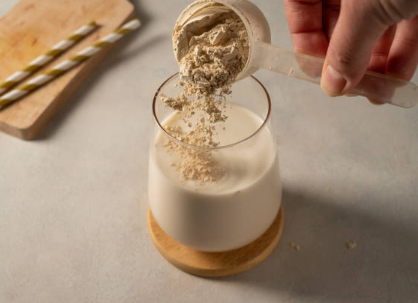Protein is a large number of nutrients that the body uses to build and maintain healthy bones, muscles, and skin.
If you’re trying to lose weight, including more protein-rich foods in your diet can help increase feelings of fullness, which may lead to you consuming fewer calories overall, leading to weight loss. Protein-rich foods are also important for building lean body mass, which may help boost metabolism, which in turn allows your body to burn calories more efficiently.

Here are five things you need to know about protein and weight loss, including how to incorporate more protein into your diet.
Protein Increases Satiety
Several studies have linked high-protein diets to increased satiety and reduced appetite.
This may be achieved by increasing satiety hormones, such as glucagon-like peptide-1 (GLP-1) and cholecystokinin (CCK), as well as decreasing the hunger hormone ghrelin-releasing peptide (ghrelin).
In addition, protein increases the number of calories burned by the body, which can also lead to decreased appetite and weight loss.
One review highlights that post-meal satiety with 25 to 81 percent protein typically increases.
Another older study found that increasing dietary protein from 15% to 30% resulted in a 411-calorie reduction in participants’ daily calorie intake. Study participants lost an average of 11 pounds over 12 weeks.
Your Body Burns Calories to Digest and Metabolize Protein
When you eat food, your body uses calories to digest, absorb, and metabolize the food. This is called the thermal effect (TEF) of food.
Protein has a higher caloric effect than fats and carbohydrates. Studies have shown that about 20-30% of protein calories are burned during protein digestion. At the same time, the thermal effect of fats is the lowest, about 0-3%, and carbohydrates – 5-10%.
Protein Maintains Lean Muscle Mass During Weight Loss
When you lose weight, you lose both fat and lean muscle. Studies have shown that people who are overweight or obese may lose 20-30% of their muscle mass during weight loss.
Muscle tissue is metabolically active and burns more calories than fat. Eating less slows calorie burning, making weight loss more difficult.
Incorporating resistance training into your workout routine and following a high-protein diet can prevent muscle mass loss. This can help prevent metabolism from slowing down and improve body composition.

In particular, some studies support the current guideline of 0.8 grams per kilogram of body weight for protein intake during weight loss.
A 2020 study of middle-aged men who were overweight or obese found that a low-calorie, moderate-carbohydrate diet that provided 1.42 grams of carbohydrates per kilogram of body weight per day preserved muscle mass better than a low-calorie mixed diet that provided 1.42 grams of carbohydrates per kilogram of body weight per day. 0.96 grams of protein per kilogram per day.
Protein Boosts Metabolism
Due to its high caloric effect and ability to maintain lean muscle mass, a high-protein diet can boost metabolism. This means that your body burns more calories throughout the day, even when you’re sleeping.
Studies have shown that a high-protein diet can increase daily energy expenditure by 70 to 200 calories, and higher protein intake is associated with an accelerated metabolism.
Protein May Prevent Weight Regain
Losing weight is hard. But keeping it off is more challenging. A review of long-term weight loss studies noted that more than half of the weight loss recovered within two years, and 80% within five years.
Another study found that increasing daily calorie intake from 15% to 18% for protein can reduce weight regain after weight loss by 50%.
Why You Need Protein
Protein is a macronutrient, which means your body needs a lot of protein to function optimally.
Every cell in the human body contains proteins. You need protein to help your body repair and build cells and body tissues. Protein is a major building block of muscles, bones, hair, skin, and internal organs. It is essential for normal growth and development, especially for children, adolescents, and pregnant women.
Protein is also involved in many bodily processes, including:
- Fluid balance
- Blood clotting
- Immune system response
- Vision
- Production of enzymes, hormones, and antibodies

How Much Protein Should You Consume
The amount of protein you need each day depends on your age, gender, body type, and activity level.
The 2020-2025 Dietary Guidelines for Americans recommend that 10 to 35 percent of an adult’s calorie intake come from protein. To reduce weight and feel full, some studies recommend a daily protein intake of 30% of your total daily calories.
You can calculate the number of grams of protein you need to lose weight by multiplying your daily calorie requirement by 0.3 and dividing it by 4 because there are 4 calories per gram of protein.
Calculate your protein needs based on a 2,000-calorie diet:
- Multiplying by 2,000 X 0.3 equals 600 calories of protein
- 600 divided by 4, which provides a total of 150 grams of protein per day
Alternatively, you can choose a specific protein target based on your weight. It is generally recommended to aim for an ideal weight of 1-1.2 grams per kilogram (0.45 to 0.55 grams per pound) when losing weight.
Talk to your healthcare provider or registered dietitian to determine how much protein you need each day. Too much protein may cause problems or be at high risk in people with kidney disease.
How to Get More Protein
Increase your daily protein intake by including a protein source in all meals and snacks.
The following foods contain about 14 grams of protein:
- 2 ounces of meat, fish, or poultry
- 2 large hard-boiled eggs
- 1/2 cup tofu
- 1 cup cooked beans or lentils
- 2 ounces cheese
Greek yogurt is also a good source of protein, containing about 20 grams of protein per jar.
If you’re finding it difficult to reach your protein goals, you can also try mixing protein powder into oatmeal, smoothies, water, or milk.
Conclusion
Protein is an essential nutrient that is essential for many bodily functions. A high-protein diet can help with weight loss by increasing feelings of fullness, boosting metabolism, and more.
You can increase your daily protein intake by incorporating lean protein sources into your meals and snacks. You can also mix protein powder into smoothies or milk to help you reach your daily protein goals.
Talk to a registered dietitian or healthcare provider to determine how much protein is right for you.